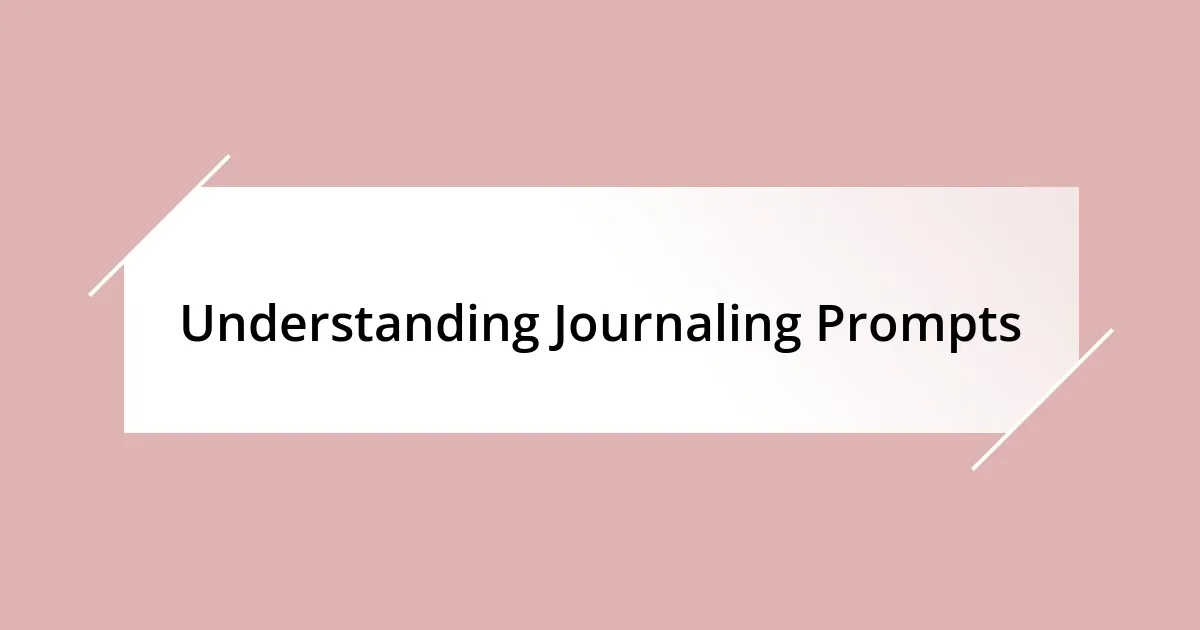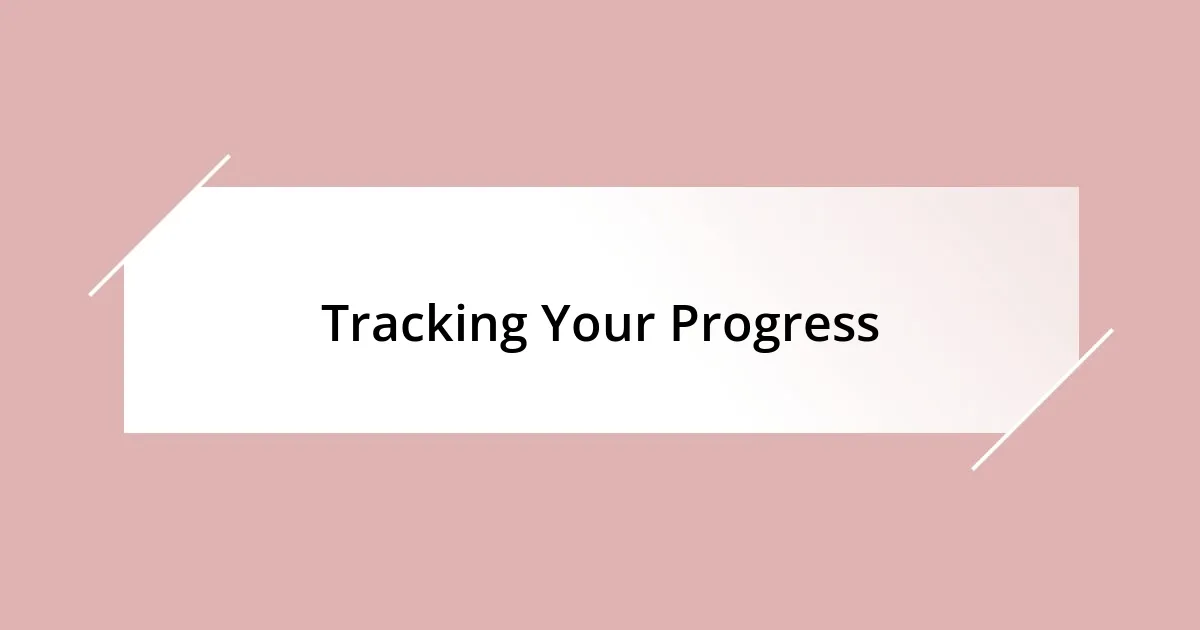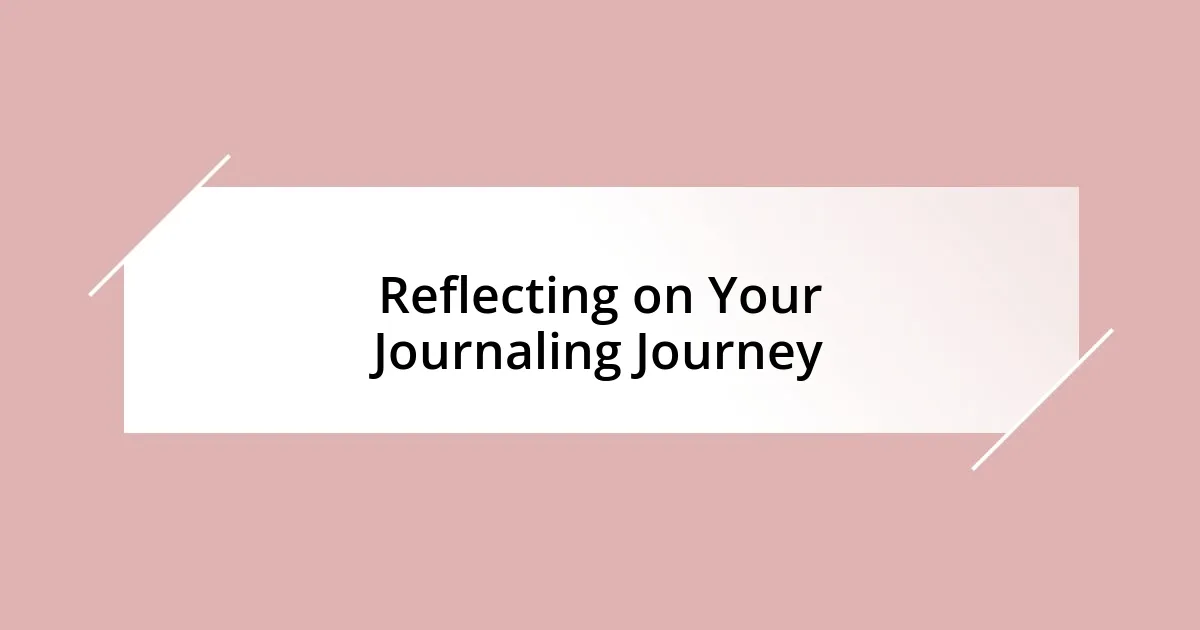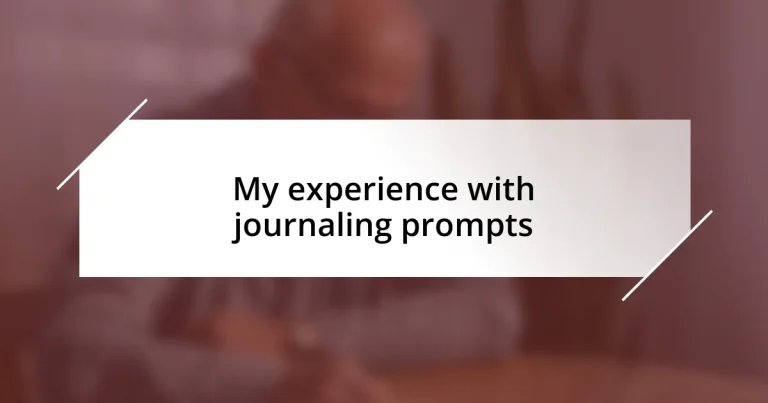Key takeaways:
- Journaling prompts facilitate self-discovery by prompting deep reflection on emotions and experiences, often leading to personal breakthroughs.
- Key benefits of using journaling prompts include enhanced self-awareness, increased creativity, emotional release, clearer goal setting, and improved writing skills.
- Effective use of journaling prompts involves finding a comfortable space, allowing free-flowing thoughts, and revisiting past entries to track personal growth.
- Reflecting on past journal entries aids in recognizing emotional evolution and setting future intentions, reinforcing personal development and motivation.

Understanding Journaling Prompts
Journaling prompts are like a gentle nudge that can spark reflection and creativity. I remember the first time I encountered a prompt asking me to describe a memory that shaped my identity. It was surprising how quickly emotions flooded back, and I realized how powerful a simple question could be. Why is it that a few words can unlock so much?
These prompts serve as gateways to deeper self-discovery. When I focus on specific themes, like gratitude or fear, it feels as if I’m peeling back layers of my thoughts and emotions. Have you ever found yourself lost in a prompt, only to emerge with clarity or a newfound perspective? I have, and it truly showcases the ability of journaling to transform our understanding of ourselves.
Not all prompts resonate equally, and that’s okay. I often find that my favorite prompts are those that challenge me to confront uncomfortable truths. For instance, a prompt urging me to list my insecurities led to profound realizations about my self-perception. Isn’t it interesting how the most challenging questions often lead to the most significant breakthroughs?

Benefits of Journaling Prompts
Journaling prompts offer a unique way to cultivate personal growth. I recall one instance when a prompt asked me to explore what success truly means to me. Initially, I felt stumped, but as I wrote, I unearthed feelings and desires I hadn’t acknowledged before. This experience taught me that prompts can illuminate paths we’re too busy to see, guiding us toward clarity and intention.
Here are some key benefits of journaling prompts:
- Enhanced Self-Awareness: They encourage introspection, helping you identify thoughts and feelings you may overlook daily.
- Creativity Boost: Facing creative blocks? Prompts can inspire new ideas, allowing your imagination to flow freely.
- Emotional Release: Writing about complex emotions can provide relief and foster healing.
- Goal Setting: They can direct your focus on what matters most, aiding in clearer goal-setting.
- Improved Writing Skills: Regularly responding to prompts hones your writing capabilities, increasing your ability to express thoughts effectively.
Each benefit has the potential to enrich your journaling experience, transforming a simple activity into a powerful tool for change.

My Favorite Journaling Prompts
My favorite journaling prompts often revolve around self-reflection and exploration. One prompt that particularly resonates with me asks, “What is one lesson learned from a difficult time?” I find this incredibly powerful because it not only encourages a deep dive into past challenges but also focuses on the growth that can emerge from adversity. Reflecting on such moments helps me appreciate the resilience I’ve developed over time.
Another prompt I cherish is, “What does my ideal day look like?” This was eye-opening for me. When I first confronted this question, I discovered that my daily life often didn’t align with my true desires. Imagining my ideal day not only ignited my creativity but also provided motivation to make small changes that brought me closer to that vision. Have you ever taken the time to visualize your perfect day? It can be surprisingly liberating.
Finally, I often turn to prompts that encourage gratitude. For instance, “List three things I’m grateful for today.” It seems simple, but on tough days, this prompt acts as a reminder of the positive aspects of my life. Each time I engage with this prompt, I realize there’s always something to be thankful for, no matter how challenging life may seem.
| Prompt | Reason I Love It |
|---|---|
| What is one lesson learned from a difficult time? | Encourages growth and resilience reflection. |
| What does my ideal day look like? | Helps align daily life with personal desires. |
| List three things I’m grateful for today. | Shifts focus to positive aspects, fostering a thankful mindset. |

How to Use Journaling Prompts
Using journaling prompts effectively can be transformative. Start by finding a quiet place where you feel comfortable and inspired. I often light a candle or play soft music to create the right atmosphere. Once you’re settled, read the prompt and take a moment to reflect on it. What feelings come up for you? This pause allows your thoughts to simmer before you dive in.
When you start writing, don’t hold back. I’ve learned that letting your thoughts flow freely can lead to unexpected insights. Sometimes, I set a timer for ten minutes and just write without worrying about grammar or structure. This flow state can uncover emotions and ideas you didn’t expect. Have you ever noticed how some of your best thoughts come out when you least expect them?
Finally, revisit your entries over time. You might be surprised by how your perspectives shift and grow. I often find it enlightening to see how my thoughts have evolved, allowing me to appreciate my journey more fully. This practice not only reinforces the lessons learned but also serves as a reminder of the progress I’ve made. How has your journaling journey helped you recognize your growth? Embrace the evolution!

Overcoming Writer’s Block
Writer’s block can feel like a heavy fog, obscuring your thoughts and ideas. I remember sitting down with my journal, staring at the empty page, feeling completely stuck. I found that when I faced this challenge, prompts became my lifeline. For example, asking myself, “What is something I’ve always wanted to say but haven’t yet?” sparked a surprising flow of thoughts. It felt like a dam breaking, releasing all the ideas I had been holding back.
Sometimes, I change my surroundings to shake things up when the words just won’t come. I’ve taken my journal to a nearby park, where the fresh air and sounds of nature helped stimulate my creativity. Have you considered how a change of scenery might impact your writing? I truly believe that different environments can unlock parts of your brain that feel locked up, allowing new ideas to flourish.
Engaging with prompts that evoke emotion can also jumpstart my writing when I’m feeling blocked. One day, I stumbled upon the prompt, “What fear have I recently confronted?” This particular question opened the floodgates to reflection and honesty. I found myself pouring out my thoughts about vulnerability and growth in a way I didn’t expect. It’s amazing how tapping into our feelings can so often reignite our passion for writing. Have you tapped into your emotions as a way to break through that block? It might just lead you to unexpected insights!

Tracking Your Progress
Tracking your progress in journaling can be one of the most rewarding aspects of the experience. I remember the first time I reviewed my entries from a few months back; it was like peering into a window of my past self. I was amazed at how much I had grown, both in my emotional understanding and in my writing style. Do you ever find that looking back reveals insights that you didn’t notice in the moment?
Another effective way I’ve tracked my progress is by creating a summary page after every month. I jot down key themes, realizations, and even my unanswered questions. This habit not only highlights my evolution but also gives me a map to navigate my thoughts better. It’s fascinating to see the threads connect over time—isn’t it? Each summary reminds me of the journey I’ve taken, reinforcing the goals I set and the growth I aspire to achieve.
Finally, I often use my journaling to set future intentions and compare them to where I started. For instance, I once wrote about a particular personal challenge, outlining the steps I wanted to take. When I revisited that entry months later, I felt a surge of pride and motivation; I had tackled the challenge head-on. This way of tracking not only celebrates progress but also fuels my determination to keep pushing forward. Have you tried reflecting not just on your past experiences but also on your aspirations? It creates a powerful cycle of growth that can be incredibly motivating.

Reflecting on Your Journaling Journey
Reflecting on your journaling journey is like looking into a mirror that reveals invisible layers of your personal growth. I still remember the excitement of flipping through my early entries, where raw emotions spilled onto the page. It felt like visiting an old friend; I could see how my fears and hopes evolved over time. Have you ever had that moment when you realized just how far you’ve come?
The power of journaling lies in its ability to document not just events, but your emotional landscape during those times. There was a period when I wrote extensively about my struggles with self-doubt. Rereading those reflections later, I was struck by the resilience I exhibited. It dawned on me that my past self paved the way for a stronger version of me today. So, what feelings have surfaced in your pages? They might hold the key to understanding your growth.
As I continued to journal, I found that reflecting on my entries often led to unexpected insights about my values and aspirations. I recall a particular prompt: “What makes me feel alive?” The exploration of that question brought clarity to my priorities, prompting me to pursue new passions. Have you ever uncovered a hidden desire through your writing? These revelations can shape your path in ways you might not have anticipated.














